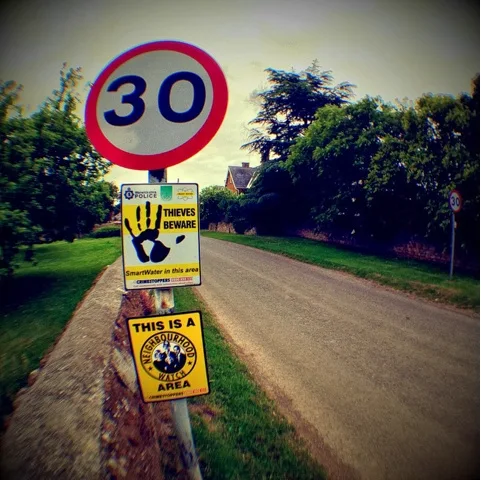The Countryside Code is a set of recommendations (or rules) for all visitors to rural – and especially agricultural – regions of England and Wales. It has its roots in the 1930s: although was only really formulated, as the Country Code, in the 1950s; and was last updated in 2012 (the version quoted below, and linked to above).
A strong case can be made that Gladman Developments are only visitors to Tysoe. Once – or, should I say, if – they obtain the planning permission necessary to destroy a centuries-old field of ridge-and-furrow, they will then sell the land on to the company who will actually build the estate. Then their brief, virtual sojourn will be over: replaced by those who will only stop – albeit for three years (akin to Dante’s vision of all three divisions of hell) – to desecrate that field with concrete, bricks, and tarmac; and reap further profit in the process. They then too will leave… – and, in the process, leave a massive urban scar as memento.
Imagine, for a moment then, that the code covered not just individuals, but also such corporate leviathans. How would its rules apply? How would they be broken…?
The first part of the code is entitled Respect other people – and asks visitors to “Please respect the local community and other people using the outdoors. Remember your actions can affect people’s lives and livelihoods.”
It’s hard not to laugh with weary resignation when it comes to this request. Gladman have shown us, as a community, absolutely no respect whatsoever; have ignored the huge amount of registered objections we posted; and were, consequently, quite condescending (and ramshackle) in their representation at the planning hearing. Their actions will, in one fell swoop, wipe out not only a field soaked in history (and, quite frequently, deep, semi-permanent puddles), but the picturesque and popular pair of footpaths that run through it – one of the best places within the parish to observe the sun setting over Oxhill (sometimes perfectly in alignment with Oxhill Road).
The second section – Protect the natural environment – is, to my mind, a reference to sustainability: stressing that “We all have a responsibility to protect the countryside now and for future generations”; and asking that visitors make sure they “don’t harm animals, birds, plants or trees and try to leave no trace of [their] visit.”
Considering the damage that will be done to the local ecology – not just the birds that feed there, and the hedges they live in; but the badgers whose setts border the plot, and whose domains will therefore be blighted not just by excavating and building, but the continuing activity of its new residents – this is insult and injury combined. The development will also, of course, remove a large and productive grazing field from the local agricultural supply.
Finally, Enjoy the outdoors…
Even when going out locally, it’s best to get the latest information about where and when you can go. For example, your rights to go onto some areas of open access land and coastal land may be restricted in particular places at particular times. Find out as much as you can about where you are going, plan ahead and follow advice and local signs.
The only “advice and local signs” I can think of, that are pertinent here, will either be villagers’ placards, or more basic ones involving the holding up of one or two fingers. In a way, this goes back to the developer’s lack of respect, their arrogance… – but the development would also ignore the large number of objective reasons outlined in the briefing paper prepared by the Tysoe Residents (Neighbourhood Planning) Group: of heritage, sustainability, access, and suitability.
The only “enjoyment” of course, is one I keep coming back to: that of profit, of counting the readies made from “pure speculative development”. (I must admit that I really struggle with the use of the word “pure”, here; and would like to suggest that a few antonyms would be more appropriate….)
By turning that “outdoors” into eighty boxes of indoors, though, “enjoyment” will be removed from those who walk regularly through the field (and I count myself amongst those people) – and for future generations… – our open-air routes now fenced in; forced to plod along the tarmacked cul-de-sacs and pavements; views narrowed, framed, or even removed, by unsustainable, unsuitable, modernity.
Sadly, though, the recommendations of the Countryside Code do not apply to money-grabbing corporate entities: those who have no feeling, sympathy – or empathy – for the nature and community (far removed from their doorsteps…) that they would destroy; replacing it instead with yet more contributions to the climate change currently flooding our fields, roads and houses.
The Countryside Code, of course, is a set of moral and ethical principles – but there are too few moral and ethical (or principled) companies (or governments) in existence to deliver the transformations we should all be working towards.
“Respect. Protect. Enjoy.” Three words that, in an ideal world, would be at the heart of the way we all lead our lives. Three words, though, that are complete anathemas to a government and capitalist system that would tell us how we should live.




No comments:
Post a Comment